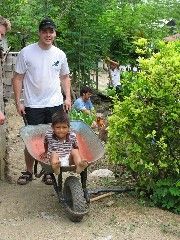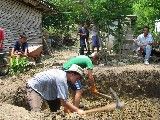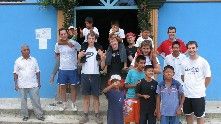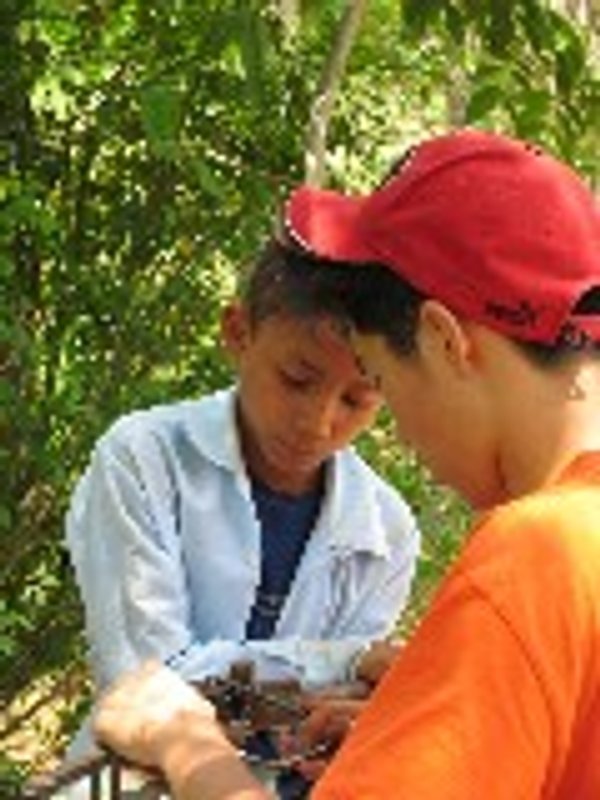The young men, together with some others such as Vancouver engineer Mario Jardon and Opus Dei’s Frs. José Ramón Martínez and Fernando Mignone, went by road 700 km southeast, from Monterrey, to Axtla de Terrazas in the State of San Luis Potosí. Nestled in the verdant foothills of the Sierra Madre Oriental, two native communities struggle to survive. Subsistence farming, and aid from relatives forced to find jobs in the big city, mark the hard life of the bilingual inhabitants of Santa Fe and El Aquichal, near Axtla.
For the past few years Monte Real University Residence, a centre of Opus Dei in Monterrey has taken the initiative of organizing trips there. Little by little different joint tasks have brought a measure of hope to the indigenous population, while the visitors have benefited even more – learning from them. Resilience in the face of hardship, resourcefulness, family values, hospitality, piety, faith in providence, loyalty to tradition, and plain joy are some of the lessons imparted by old and young alike.

This July, the university students worked together with men of Santa Fe and El Aquichal in construction projects and in the digging of septic tanks. Even local boys chipped in, for instance, when 40-degree-Celsius heat and high humidity slowed the pace. Many students also visited families, who typically live in thatched-roof houses with packed-dirt floors. “They welcome you warmly into their homes, as if they knew you,” remarked Jacob Simpson, of London, Ontario, who is in his last year of an environmental business program at the University of Waterloo.
Oranges have long been the mainstay of the local economy. Several reasons, however, such as lack of irrigation and a changing rainy season which have diminished their quality, and transport dealers who sometimes gouge the farmers of that region, have made the growing of oranges no longer cover the cost of their production. Discussions with local authorities confirmed their keen interest in continuing this project and expanding its scope. A long-term plan is being developed, including help to farmers for diversifying crops, and educational initiatives. More specifically, besides the manual work, the plans for the summer of 2006 tentatively call for teaching basic computer skills and English in the schools of both localities, as well as spending more time with young
people, and visiting families. “I would like to go back next year and help with some of the classes,” said Kingston native Gerhard Freundorfer, who is starting an Arts degree at York University in Toronto. He will also be a resident of Ernescliff College, which co-sponsored the international service project.

A high point was the celebration of the feast day of Our Lady of Mount Carmel at the Santa Fe mission church, built (but not yet completely finished for lack of funds) by the people themselves. Fr. José Ramón said Mass that day, as she is their patroness, to an overflowing congregation which had festooned the church with flowers and banners, and which afterwards invited the visitors to share in their celebration, with soft drinks and tacos.

Another “high point” was the arrival of downgraded hurricane Emily, which obliged the campers to scamper the 700 km north to Monterrey a day ahead of schedule. The extra time in the city was well used. A few days of study and rest allowed them to reflect on the work of the previous days, to make suggestions for the future, to get to know more about the social teachings of the Church and Mexican history, culture and society. Visits to various social works in Monterrey helped them visualize how citizens can put into practice social responsibility and solidarity. Of course, friendships without borders were born. Antony Tomory, who lives north of Toronto, stayed with a family in Monterrey for a few more days, after the others had left, to learn Spanish. He then capped his summer by attending the 20th World Youth Day with Pope Benedict XVI. So did Matthew Jang, another participant, who went to Cologne with a Peterborough diocese group; he resides near Peterborough and attends Trent University. The other Canadian student was Ian Mendiola, who is going into first year at University of Western Ontario; he is from the Toronto suburb of Mississauga, and has been frequenting Ernescliff College since Grade 9.
